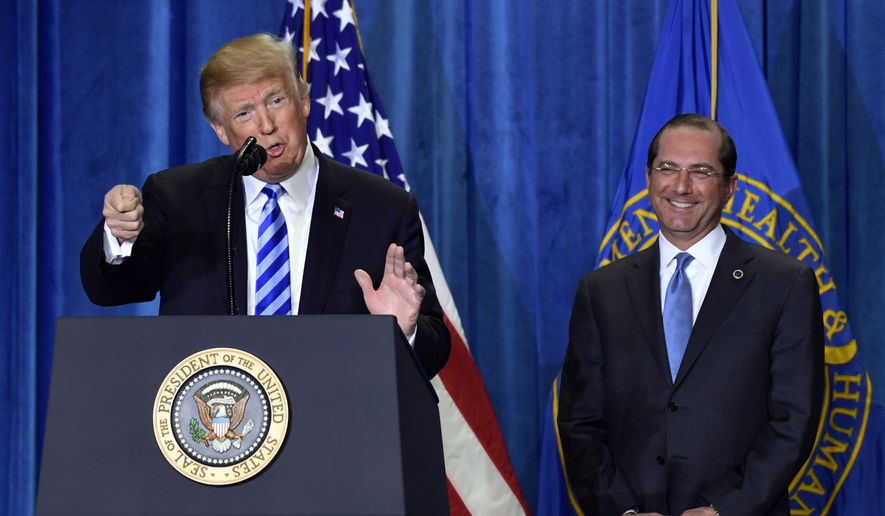Health Secretary Alex Azar said President Trump’s bid to tie what the U.S. government pays for certain Medicare drugs to what other nations pay won’t cripple innovation or access to vital treatments, even if the plan is one of Big Pharma’s “ultimate nightmares.”
“I can tell you because it used to be my job to have pharmaceutical nightmares,” Mr. Azar, a former executive at Eli Lilly USA, told the Brookings Institution.
“Change is coming,” he told drug companies. “You cannot stand by or defend the status quo on drug pricing.”
Mr. Trump says the plan to peg prices under Medicare Part B to an “international pricing index” will correct a “rigged” system in which Americans effectively subsidize drug innovation and lower costs in nations like Germany, Japan and Canada.
The payment experiment will be phased in beginning in late 2019 or 2020 and affect half of the country.
The Pharmaceutical Research and Manufacturers of America (PhRMA), a major lobbying group, is crying foul, saying the proposal will upend a competitive and innovative marketplace in the U.S., where patients get access to cutting-edge drugs faster than other developed countries.
“The administration is imposing foreign price controls from countries with socialized health care systems that deny their citizens access and discourage innovation. These proposals are to the detriment of American patients,” PhRMA President and CEO Stephen J. Ubl said.
Yet Mr. Azar disagreed, saying Big Pharma is “never going to walk away” from the huge U.S. market and will have to either raise prices abroad or find space in their budgets to adjust to the new reality.
He said under the model, the U.S. will still be paying about 126 percent of foreign prices.
“They’re going to walk away and play a game of chicken? I don’t think so,” the secretary said of drug makers.
Mr. Azar rejected the idea that Mr. Trump — who balked at Democrats’ pleas to set prices directly — is outsourcing the U.S.’s responsibility for maintaining low prices to other countries.
He said Part B already pays a set a price to doctors without the ability to negotiate, like Medicare’s Part D program does.
The problem right now, he said, is “it’s just a really stupid way to set prices.”
The administration says its plan should save the government $17 billion over five years, and seniors should see lower costs at the pharmacy counter under the plan, because their out-of-pocket costs are pegged to the overall price.
“This is a huge win for patients,” Mr. Azar said.
Part B is the segment of Medicare covering drugs dispensed in doctors’ office and outpatient hospital clinics — not ones found at pharmacies.
Under the new model, vendors will purchase drugs and dispense them to physicians, so doctors don’t buy them directly.
Doctors should be focused on treating patients, and not “not floating capital for pricey drugs,” Mr. Azar said.
Also, the government will pay a flat flee to doctors and hospitals who store and administer Part B drugs, rather than a percentage of the price, so providers aren’t tempted to use higher-cost medicines.
• Tom Howell Jr. can be reached at thowell@washingtontimes.com.




Please read our comment policy before commenting.